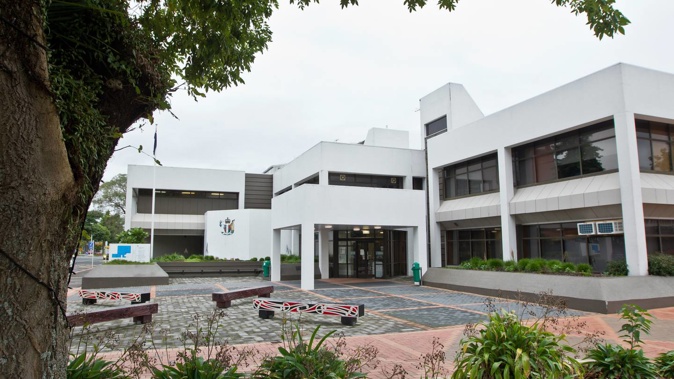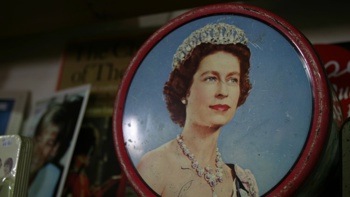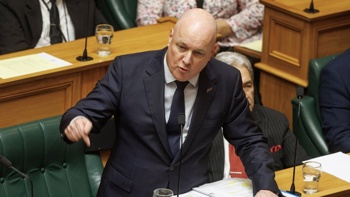
WARNING: This story contains content that may be upsetting to some people
A former flatmate and two former police officers have told a Rotorua District Court jury a woman was in a distressed state just hours after she says she was raped in Rotorua in 1991.
They were giving evidence for the Crown in a trial of Chris Budgen, who has pleaded not guilty to raping a woman in Rotorua on September 15, 1991.
It is the Crown’s case that then-18-year-old Budgen had been drinking at pubs after playing a game of representative rugby and saw the woman walking on Amohau St. The Crown says Budgen went up behind the woman, put his hand over her mouth, dragged her down an alleyway and raped her against a wall.
Police didn’t make any arrests at the time, but advances in forensic science led police to Budgen in the United Kingdom more than 21 years later.
Budgen, now 49, was a prop for the U19 Northern side that played a curtain-raiser for an NPC match. His defence is that he had consensual sex with a woman he did not know at his accommodation.
The former flatmate, who cannot be named for legal reasons, told the jury of six men and six women that the woman came home in the early hours of September 15, 1991 and woke him up.
“She came into my room. She was extremely distressed. She was crying and trying to talk to me. I had never seen her like that before.”
The flatmate described her as incoherent, but not in a drunk way, as he was able to calm her down after about 10 minutes. She then told him she had been raped by an unknown man in an alleyway on Amohau St.
The woman told her flatmate she had called police already but, at that stage, they had not arrived at their home. He told her to call them again, which she did.
One of the police officers who arrived, former sergeant John Casanelia, said when the woman called the police station the first time, she said she had been assaulted. When she called again, she said she had been raped.
Casanelia said when he arrived at her home, she was sitting in a lounge chair holding a soft toy and crying.
Former police officer Eric Grace told the court he had noticed the woman walking home on Amohau St near Ranolf St about 4.25am, and had pulled over to offer her a ride.
He said she accepted, but she was sobbing and visibly upset. He said she was “hugging the door” inside the patrol car, trying to put as much distance between herself and Grace as possible.
He tried to ask her if she had been assaulted, but she did not reply. Just before he dropped her off, he asked her if it was personal, and she replied, “It depends what you mean by personal”, before she got out of the car and went inside her home.
When asked by Crown prosecutor Anna McConachy what he thought had happened, he said it “appeared like she had suffered some kind of trauma”.
Ron Currie, who was Budgen’s team manager for the September 14, 1991 game, gave evidence that it was common practice for players to be billeted at the homes of host team members. He couldn’t remember the specific arrangements for each player for that game.
He said once the game and post-match speeches had been completed, the players were free to leave with their billets and do what they wanted.
Former Rotorua police detective John Hope, who was the officer in charge of the investigation from 2015, said he contacted Budgen and other family members when DNA testing led to a positive match to a relative.
He said Budgen, who was a member of the British Army at the time, said he had nothing to hide and was happy to provide a DNA sample.
He told Hope he had been to Rotorua a few times to play rugby, but couldn’t remember when. He told Hope he “certainly didn’t rape no chick”.
A sample was arranged to be taken by a police detective who happened to be in the UK.
Budgen told Hope he had been “racking his brains” about trips to Rotorua and remembered leaving a pub with a woman who said she was Australian before going back to a hotel or travel lodge, Hope said in evidence.
Budgen told Hope he thought he was sharing the room with another team member.
Hope later contacted Budgen again and confirmed the DNA sample was a match, to which Budgen replied “aye”.
The trial, before Judge Eddie Paul, started on Monday and is expected to take four days.
SEXUAL HARM
Where to get help:
If it's an emergency and you feel that you or someone else is at risk, call 111.
If you've ever experienced sexual assault or abuse and need to talk to someone, contact Safe to Talk confidentially, any time 24/7:
• Call 0800 044 334
• Text 4334
• Email [email protected]
• For more info or to web chat visit safetotalk.nz
Alternatively contact your local police station - click here for a list.
If you have been sexually assaulted, remember it's not your fault.
Take your Radio, Podcasts and Music with you









